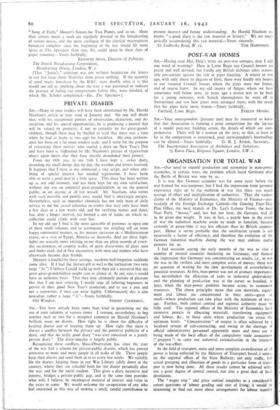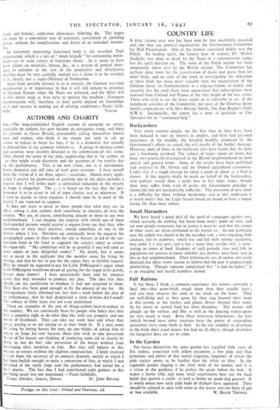ORGANISATION FOR TOTAL WAR
Sta,—Our need to expand production and economise in man-power resembles, in certain ways, the problem which faced Germany after the Battle of Britain was won by us.
It is true that German economy was for some years before the war framed for war-purposes, but I had the impression from personal experience right up to the outbreak of war that there was much wastage of effort and multiplication of authorities. Thus the various claims of the Ministry of Economics, the Ministry of Finance—par- ticularly of the Foreign Exchange Control—the Goering Four-Year Plan Office, the local branch of Dr. Ley's Labour Front, the local Nazi Party "bosses," and, last but not least, the Gestapo, had all to be given due weight. It was, in fact, a puzzle how in the event of war the industrial machine could be made to function, because certainly in peace-time it was less efficient than its British counter- part. Hence it seems probable that the totalitarian system is not necessarily a factor of efficiency, and therefore the evolution of the German industrial machine during the war may contain useful pointers for us.
I had occasion outing the early months of the war to visit a number of neutral countries bordering on Germany, and formed the impression that Germany was concentrating on results, i.e., to win
the war in the swiftest and most complete series of moves; there was no question of waiting for the slow development of overwhelming potential resources. At first, man-power was not of primary importance,
but nevertheless the allocation of tasks to industrial kuidertakings -and the planning of production was at the outset so handled, as
later, when the man-power problem became acute, to economise resources. The above principles mean that raw materials, equip- ment and labour are concentrated in their units—great or small—where production can take place with the minimum of wast- age. Further, both central control and regional authority must be fully used. The regional offices of the Ministry of Economics have extensive powers in allocating materials, transferring equipment and labour, &c, to those units where production can attain the optimum levels. " Concentration " of output is often achieved by a localised system of sub-contracting, and owing to the shortage of official administrative personnel apparently more and more use is being made of the local offices of the compulsory trade associations (" gruppen ") to carry out industrial rationalisation in the interests of the war-effort.
In the field of transport, more and more complete co-ordination of all power is being enforced by the Ministry of Transport, based, it seems, on the regional offices of the State Railway; not only traffic, but actual grouping and allocation of goods to a particular form of trans- port is now being done. All these results cannot be achieved with- out a great degree of central control, but also a great deal of local devolution.
The "wages stop" and price control simplifies to a considerable extent questions of labour grading and cost of living; it would be interesting to find out more about arrangements for labour transfer (male and female), sepifration allowances, billeting, &c. The wages tax must be a convenient way of automatic curtailment of spending power, without the complications and delays of an extended income- tax.
An extremely interesting functional body is the so-called Todt organisation, which is a sort of "shock brigade" for overcoming bottle- necks—as its wide variety of functions shows. As it seems to have prior claims on materials, labour, &c., in a system of general short- ages, its relations to the rest of the productive and distributive machine must be very carefully worked out if chaos is to be avoided; it is, clearly, not a super-Ministry of Production.
Apart from possible interest to us at present, the German war-time organisation is of importance in that it will still remain in existence in German Europe when the Nazis are defeated, and the Allies will in this initial stage at least have to operate the machine: European reconstruction will, therefore, at least partly depend on knowledge of it and success in making use of existing conditions.—Yours faith-



























 Previous page
Previous page